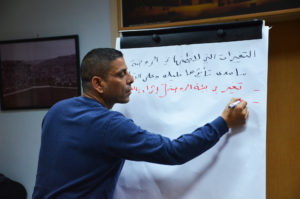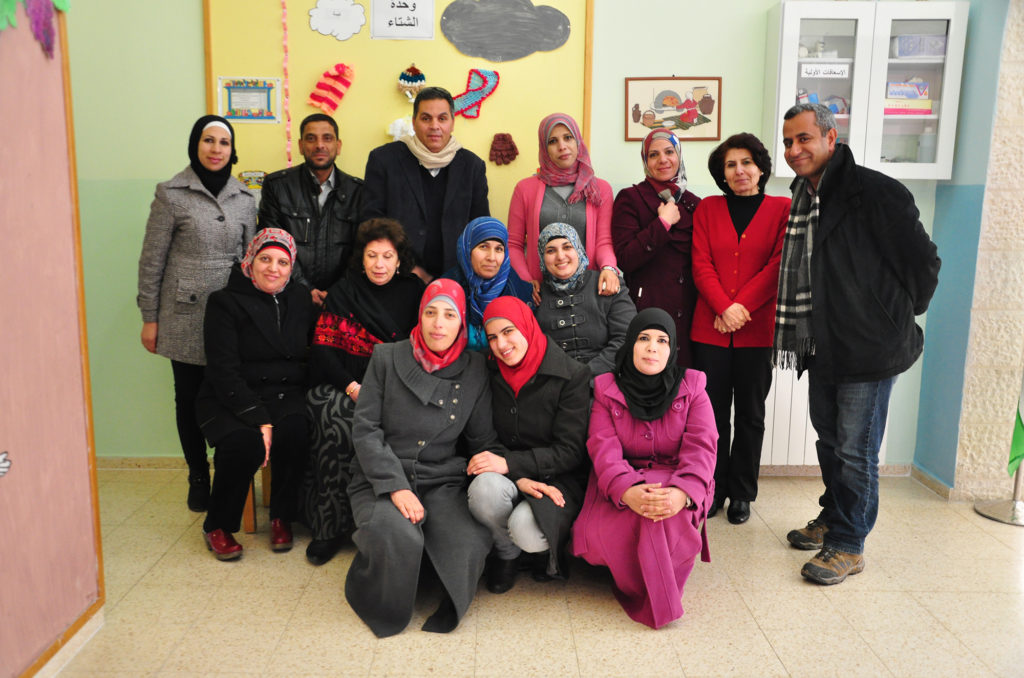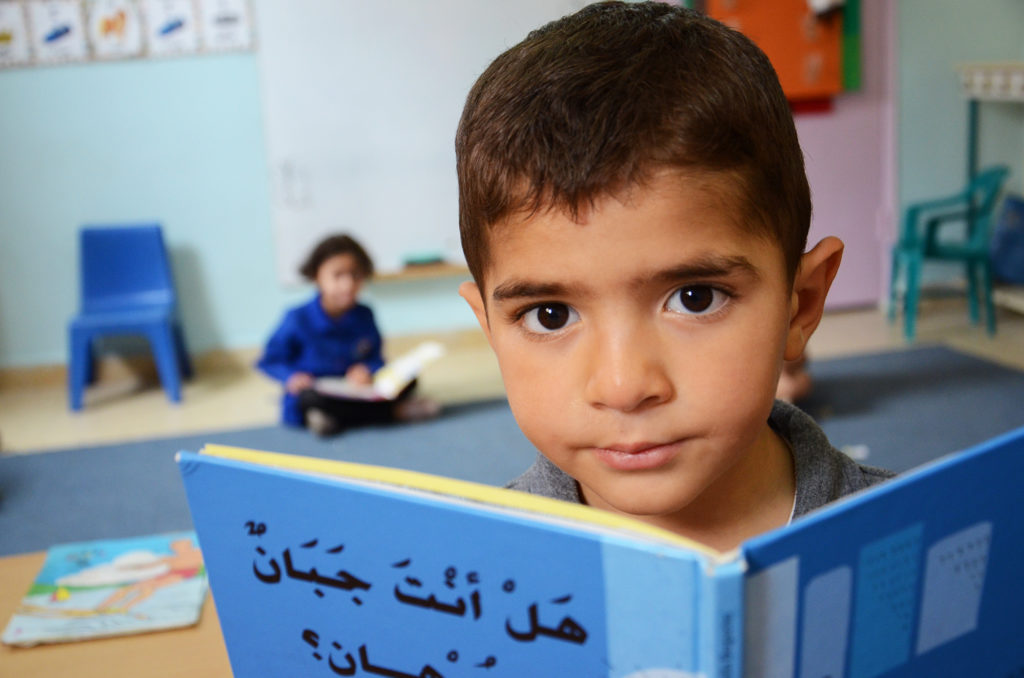How Palestinian Children Can Get the Right Start
Posted in: Voices from the field


Trainer Akram Jawabreh educations West Bank teachers on early childhood development.
My childhood was the most beautiful time of my entire life. I used to spend my time playing in the alleys of Arroub refugee camp, my home in the West Bank. Despite the camp’s uncovered sewage canals, poor lighting and dusty, unpaved streets, life was not complicated. My neighbors and I made a playground of the narrow streets and the surrounding vineyards and fields. Back then, we had no worries of what tomorrow would bring. How beautiful and simple was that time, in comparison to what today’s children are forced to endure.
Everything changed during the First Intifada in 1987. That’s when our childhood ceased, as it was no longer enjoyable. The impact of the uprising was tangible on all households in the refugee camp. We lost loved ones and experienced a great amount of suffering and pain during military incursions and arrests. Perhaps I was more innocent in my perception and awareness than my peers at that time, but I remember hoping for a peaceful Eid each year, knowing that it was unattainable. Things never seemed to quiet down in regards to skirmishes and confrontations with Israeli forces, and the Intifada was followed by a second one.
I don’t believe that today’s youth are enjoying childhood like my generation did, as the reality is much harder for them. Today, children share with adults the growing fears, anxieties and restrictions of life under occupation. I sympathize with parents and caregivers for all the challenges they have to endure. As a father, I know firsthand how difficult it is to raise a child in Palestine. Especially today.
We Reap What We Sow
The political environment has caused economic and psychological pressure on people, especially parents, whom children look up to as their role models. That built-up pressure negatively affects social upbringing. Consequently, you see many families that resort to violence or strong verbal reproach and scolding in dealing with their children, who in turn, replicate this approach with their peers.
You also see parents who advocate for violence and strongly believe that it is a fundamental means of raising children. “I’m hitting you because I love you, because it is for your own good” that’s how we, as a society, justify the violence we commit against our own children. Watching the violence on the news or even social media, unsupervised, or overhearing adults’ serious talk about it may even trigger children to act violently sometimes, out of fear or desire to imitate.
How most of us parents have fallen into similar traps, not realizing the deep pain and scars we’re inflicting on our children. We must educate our youth, especially young men and women who are on the threshold of marriage, on how to appropriately and peacefully deal with children.
The lack of healthy practices in dealing with our children will cause the same psychological scars and damage that we, as parents, had in the past. As adults, we don’t accept poor treatment and it’s the same for our children. We have to educate our children to behave peacefully in order to have a productive future generation.
Reshaping Palestinian Society


Anera’s West Bank team working on early childhood development for Palestinian children.
Change begins with reshaping society’s unhealthy inherited practices and beliefs. Local and international organizations can play an instrumental role in spreading awareness and changing mentalities. On an individual level, we must begin with ourselves and our families, and then spread awareness in our communities.
In my former work for international NGOs, I was among different teams that implemented similar projects in local schools. I conducted child and human rights awareness sessions with school principals and teachers, children and parents. At one point in my career, I supervised a program that benefited 99 deprived schools across the West Bank.
We equipped adults with non-violent skills and contemporary methods in parenting, and taught older children means of self-expression, conflict resolution, teamwork, cooperation and communications skills. Children vary in their awareness of their rights and the child’s intellectual maturity and social intelligence plays a prominent role in exercising them.
We can’t change society, we can’t defy the present system, beating is parenting necessity, etc. These are some of the most common ideas and remarks we dealt with in our work. As for children, statements like “I’m not stupid enough to be beaten and not strike back.”
I still recall one incident when an overweight child in seventh grade was called a “potato” by his teacher instead of his actual name. It sums up how we unintentionally hurt and insult our children without reason and without realizing how we can tarnish their self-image.
A key message to the teachers that I always try to convey is: don’t pass on the damages from your childhood to the kids that you teach.
Early Childhood Development with Right Start!


A kindergarten boy in Qalandia refugee camp, West Bank.
I’ve been in the field of human rights since 2004. One of the most acclaimed organizations that I have worked for is Anera. Right Start! is Anera’s early childhood development initiative that aims to prompt the respect of child rights within Palestinian society.
It’s quite challenging to make a breakthrough in the behavior of a 15-year-old boy and even extremely difficult to change an adult’s behavior. But what about investing in the five-year-old child? What about injecting rights and peaceful approaches in these young children? Imagine the change we can bring about!
Anera’s Right Start! project endeavors to change teachers’ behavior in dealing with children. It educates teachers and parents on respecting child rights. It aims to create a safe and a stimulating learning environment as kindergarten must provide Palestinian children with what they been have been deprived of at home and within their local communities.
In Arabic, the word for kindergarten is rawda. It means in English haven. This is what a kindergarten will be when teachers and the community respect child rights.
OUR BLOG
Related
In Gaza, systematic bombardment of civilian housing and infrastructure has created a crisis of shelter that is endangering over a million.
The undersigned members of the Association of International Development Agencies (AIDA) urgently call upon the international community to intervene and halt settler attacks targeting Palestinian civilians and protect Palestinian communities near illegal settlements. The International NGO Community urges international actors…
